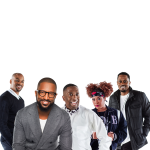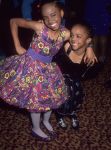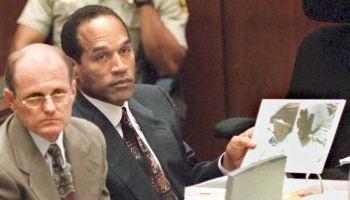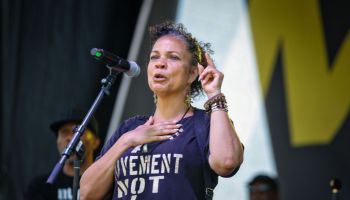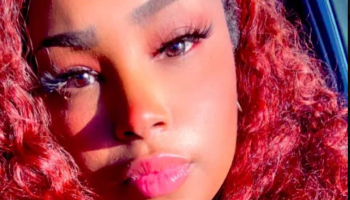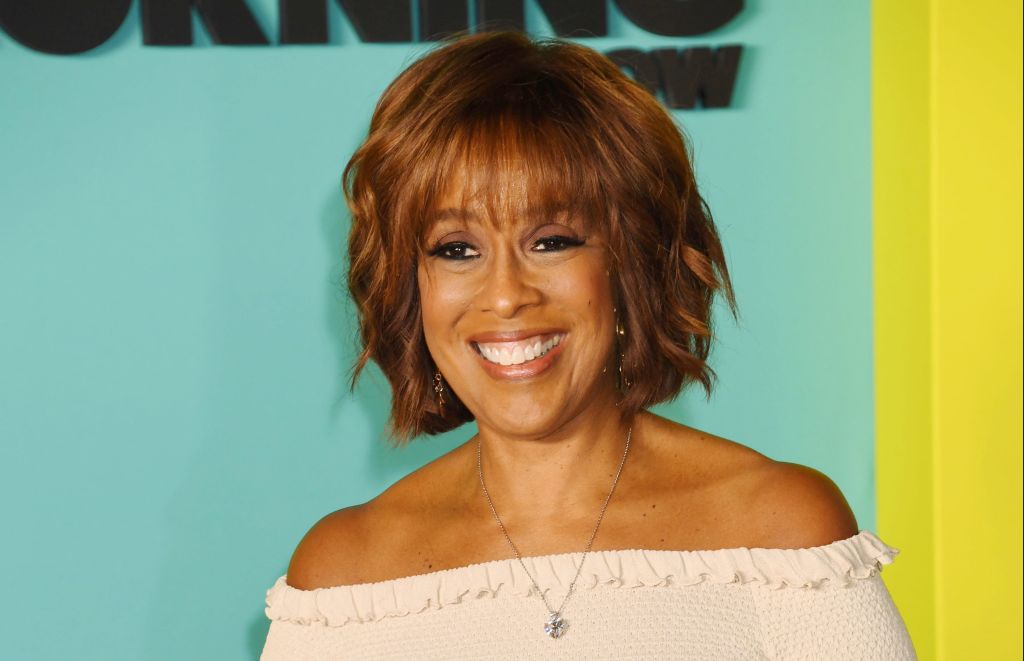
Source: WENN/Avalon / WENN
If we’re going to have the conversation about whether Gayle King was wrong for bringing up the late Kobe Bryant‘s rape case during an interview with WNBA legend Lisa Leslie, then context and nuance are key. And judging by social media responses, many people are missing those components.
King has been called everything from a “funky dog-head b*tch” to a “sellout” just for asking Leslie this question about Kobe:
“It’s been said that his legacy is complicated because of a sexual assault charge which was dismissed in 2003, 2004. Is it complicated for you as a woman as a WNBA player?”
A good amount of tweets were devoted to the belief that King shouldn’t have asked this question and made far-fetched accusations against King that lack evidence. In King’s defense, check out three of the accusations below and how they can be debunked.
1. Gayle King is trying to “tarnish” Kobe Bryant’s legacy
https://twitter.com/WITBTV/status/1225087826846310400
Gayle King is a broadcast journalist. A journalist’s job is to provide context to a topic, especially if the political climate for the topic has changed over the years.
We are in the #MeToo era. The way the media has talked about sexual assault has changed over the past 20 years, especially when #MeToo went viral in 2017. Since then, campaigns like #MuteRKelly have led to the indictment of powerful men who have long gotten away with sexually abusing women and girls.
However, if you just pay attention to the legal and criminal ramifications of the #MeToo movement, it’s easy to overlook what the movement was about in the first place … the victims.
#MeToo founder Tarana Burke has constantly said in interviews that she started the movement as a support system for victims of sexual assault and abuse, and not solely to bring down powerful men. With that being said, we are currently in a moment where people are trying to reconcile the accolades of a figure but also understand them as alleged abusers. According to the Rape Abuse and Incest National Network, eight out of ten rapes are committed by someone known to the victim. While some of these acts might have been settled in or out of court, not everyone has fully processed or healed from the alleged abuse, even after the alleged abuser has died.
Many publications — including Slate, Time, New York Post and The New York Times — have addressed these sentiments as they pertain to Kobe’s alleged assault before King even brought it up. As a journalist, it was King’s job to not ignore the people who were writing about it, but to understand the conversation and to get the perspective of someone close to Kobe, Lisa Leslie. King ended their conversation by asking Leslie if the media should continue bringing up the rape allegations against Kobe, which arguably shows that King wanted clarity on the topic as a journalist herself.
“Is it even a fair question to talk about it, considering he’s no longer with us and that it was resolved or is it really part of his history,” asked King. Leslie responded, “I think that the media should be more respectful at this time. If you had questions about it, you had many years to ask him that. I don’t think it’s something that we should keep hanging over his legacy.”
Clearly, Gayle was seeking the answer to a question many people were asking and she received it from Bryant’s close friend. This is not sensationalism or King trying to “tarnish” Kobe’s legacy. This is understanding the media climate and asking the hard questions as a journalist to receive the answers.
2. Gayle King is harder on Black men accused of sexual assault than she is on white men.
Many people have argued that King has had these close relationships with accused abusers like Harvey Weinstein and Charlie Rose, even going so far as to dig up old photos of King and them together. People have used these pictures to argue that King has gone light on white people accused of sexual assault while going extra hard at Black men accused of sexual assault.
This is hard to believe for a couple of reasons.
First of all, King could have very well taken those pictures before she even knew of allegations against Weinstein or Rose. If she did know about the allegations before they became public, then yes, this is something we should hold her accountable for.
However, once they did become public, King did not completely ignore the allegations. Just last year, she interviewed Weinstein’s defense lawyer, Donna Rotunno, and applied as much pressure to her as she did Lisa Leslie or any other person she’s interviewed. She brought up the fact that Weinstein was accused of abuse or assault by over 70 women and she asked Rotunno, “How does Harvey explain those allegations?”
She also pressed Rotunno, saying she seemed to be minimizing the “serious” accusations against Weinstein and she asked her “Do you ever worry that you’re making it harder for women who have been sexually harassed, assaulted, raped, to come forward?” Then, when Rotunno tried to place the onus of sexual assault on women, King followed up with, “Doesn’t a man have to take responsibility for his actions too?”
If this isn’t applying pressure to Weinstein and his defenders, I don’t know what is. It’s quite possible that Weinstein was declining interviews at the time, so King’s next closest source was his lawyer, and King asked the hard questions.
As for King’s relationship with Charlie Rose, she did say that she still considered him a friend back in 2018 despite an additional 27 women accusing him of sexual harassment or assault. “I know that’s probably not the politically correct thing to say this moment, but I don’t believe in abandoning friends when they’re down,” she said on the set of “CBS This Morning”. She added, “I don’t know what more we can do to Charlie Rose, except a public flogging. He’s gone. He’s not coming back to CBS News.”
She then said that she’s “sick of handling” the Charlie Rose story but added, “you can’t ignore what these women are saying and that’s also apart of my anguish here. To know that women were hurt and are saying the things that they’re saying, and I think it’s good that we’re having this conversation.” When her co-host said that “CBS This Morning” would continue to cover the Charlie Rose allegations, King added, “And we will cover it. That’s the thing, we’re not running away from it.”
With this short segment, it’s clear that King isn’t avoiding sexual misconduct allegations just because the alleged abuser is her friend. It’s clear that as a journalist, she’s still ready to cover the whole story about a person’s legacy and their alleged acts of harm. This is the same tough approach that she brought to Kobe Bryant’s case. In her interview with Lisa Leslie, they talked about the rape allegations against Kobe. But they also talked about his mentorship to women athletes, his love of Michael Jordan and his life as a loving father. King did not single out the allegations against Kobe as a way to “tarnish” his reputation. Similar to Charlie Rose, she just didn’t want to ignore things that were made very public in the media.
If folks aren’t ready for this conversation — or don’t want to have the conversation at all — that’s their prerogatives. But dragging someone who wants to have the conversation by claiming she’s only doing it with Black men and not white men is not accurate. Folks are also allowed to critique King on still being friends with an alleged abuser. However, if we do a deeper dive into the celebrities and close people we know who have been accused of harm, can we honestly say that we’ve cut them off completely? Abusers are not some boogie man that lurks in the dark. They are family, they are friends, they are acclaimed celebrities, they are white folks and they are Black folks. Completely dragging someone for bringing up these points isn’t going to solve the problem.
3. Gayle King is trying to divide Black men and women (a.k.a. She has an “Agenda Against Black Men”)
When people say this, essentially what they mean is we shouldn’t prioritize sexual assault along with race issues.
The problem with this argument is that it seems people don’t view sexual assault as a traumatizing and life-altering experience that, in fact, affects Black people, especially Black women. They don’t view it as a serious incident that can trigger or heighten mental health issues such as anxiety, depression or post-traumatic stress disorder. They especially don’t see it as a priority on the agenda for Black liberation.
People who make this argument also don’t view the conversation around sexual assault as a place for growth that could, in fact, benefit Black men. If you really care about the entire Black race, then that means you care about Black men and women not harming each other, right? That means you care about eliminating intimate partner violence no matter your gender or sexual orientation right? So why wouldn’t a conversation about sexual assault be beneficial?
https://twitter.com/trinsativa/status/1226869167804108800
Many people’s concerns about having these conversations publicly are steeped in people’s fears that another Black man will go to prison or be stripped of accolades that have long inspired Black communities. There is also a very real history of Black men being accused of assault by white women and facing harsher consequences than their white counterparts. These are understandable concerns and could have very well played a part in the anger towards Gayle King. The system is messed up and prisons as an adequate response to harm is a burgeoning debate, especially in a climate of criminal justice reform or abolition.
However, to say King is trying to divide Black people or has an “agenda” against Black men is not fully backed up, as addressed in point number two above. Because these claims lack evidence, they feel like a cop-out to talking about sexual assault and it dismisses the violence that can come towards people who speak on it. It feels like a silencing technique that says, instead of revisiting the criminal accusations against Kobe, instead of revisiting the alleged victims claims and Kobe’s claims, instead of revisiting Kobe’s subsequent apology once the criminal charges were drop, let’s completely erase this part of Kobe’s life from history just to protect him from white people.
Let’s erase incidents that could possibly become learning moments for countless Black men or people trying to understand or heal from sexual violence. It seems the threat of white people, the threat of prisons or the threat of false white accusers has caused people to want to completely ignore sexual assault. It begs the question: If these forces weren’t at play, how serious would people be about discussing sexual assault?
It’s fine if you’ve moved on from Kobe’s case, but why can’t people like Gayle King address the folks who are still trying to gain clarity. The people who might still be angry. These people are Black women, Black LGBTQ+ folks and yes, even straight Black men.
In Defense Of Gayle King: Debunking 3 Ridiculous Arguments was originally published on newsone.com



